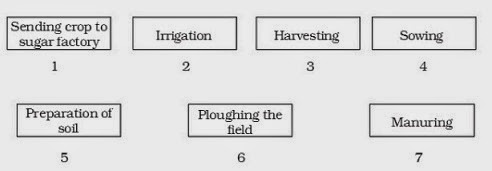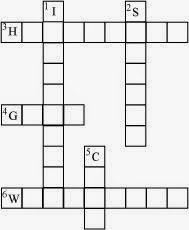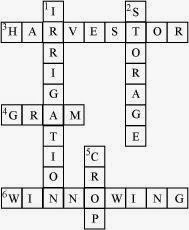NCERT Solutions for Chapter 1 Crop Production and Management Class 8 Science
Book Solutions1
float, water, crop, nutrients, preparation
(a) The same kind of plants grown and cultivated on a large scale at a place is called _________.
(b) The first step before growing crops is ________ of the soil.
(c) Damaged seeds would _________ on top of water.
(d) For growing a crop, sufficient sunlight and _________ and _________ from the soil are essential.
Answer
2
Match items in column A with those in column B.
|
A |
B |
||
|
(i) |
Kharif crops |
(a) |
Food for cattle |
|
(ii) |
Rabi crops |
(b) |
Urea and super phosphate |
|
(iii) |
Chemical fertilisers |
(c) |
Animal excreta, cow dung, urine and plant waste |
|
(iv) |
Organic manure |
(d) |
Wheat, gram, pea |
|
(e) |
Paddy and maize |
Answer
|
A |
B |
||
|
(i) |
Kharif crops |
(e) |
Paddy and maize |
|
(ii) |
Rabi crops |
(d) |
Wheat, gram, pea |
|
(iii) |
Chemical fertilisers |
(b) |
Urea and super phosphate |
|
(iv) |
Organic manure |
(c) |
Animal excreta, cow dung, urine and plant waste |
3
Answer
4
Answer
5
Answer
|
Fertiliser |
Manure |
|
Fertilisers are commercially available plant nutrients. |
Manure is a natural substance prepared by the decomposition of animal excreta and plant wastes. |
|
They can be organic or inorganic in nature. |
Manure is known to have a large quantity of organic materials and very little amount of plant nutrients. |
|
They ensure healthy growth and development of plants by providing them with nitrogen, phosphorus, potassium, etc. |
They help in enriching the soil with organic matter and nutrients. |
|
The addition of fertilisers to the soil requires special guidelines such as dose time, post addition precautions, etc., to be followed. |
The addition of manure does not require any special guidelines. |
|
A fertiliser does not provide any humus to the soil. |
Manure provides humus to the soil and increases soil fertility. |
|
Its excessive use causes water pollution. It cannot replenish organic matter of soil. |
It protects the environment and helps in recycling farm waste. |
6
Answer
7
Answer
If wheat is sown in the kharif season (from June to October), then the whole crop might get destroyed because of many factors such as lack of optimum temperature, adaptability, availability of pests, etc. Kharif season includes the rainy season, which is not favourable for the growth of wheat crop. Therefore, wheat crop should not be sown during this season.8
Answer
If continuous plantation of crops is done in the fields then the soil will become poor in necessary nutrients like nitrogen, phosphorus, potassium, etc. Plants require nutrients for their proper growth and functioning. When a farmer continues to grow crops one after the other, then all nutrients available in the soil reduce and the crop yield decreases automatically.9
Answer
10

Answer

11

Answer
